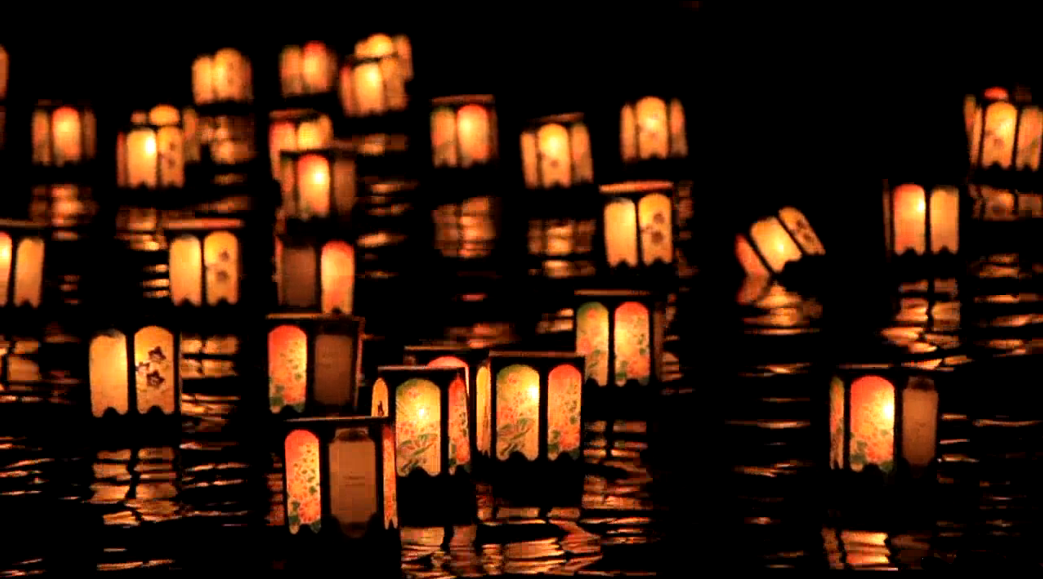Lamps, warm and white-gold, slide away from outstretched arms, gently bumping their way down a glassy ribbon of water. One-by-one they glide and turn, flame-brightened paper gradually yielding to the river, succumbing with a wisp of smoke, as fleeting as memory. They are a fairy-train, slowly vanishing into the darkness; the stars of the Milky Way gradually winking out; fireflies disappearing with the encroaching autumn. They are spirits - returning to the world of the dead.
Those left on the river-banks gaze out after the illuminations, secretly hoping their own will burn longest, disappear last. As some glowing flames gutter and acquiesce to the embrace of the river, their watchers slip away from the bank. Others remain until the last light gutters, imagine the hiss of the ignited wick meeting water and the disintegration of the taut rice-paper.
It is Toyo Nagashi, the penultimate celebration of Obon.
Recently, I have been thinking a lot about the Obon celebration, which takes place every year in the middle of July. It is a Buddhist festival honoring the spirits of the dead and, similar to South America’s Dia de los Muertos, it is a time for family and friends of the departed to gather and honor their ancestors by cleaning the family grave, giving offerings of food and prayer, and celebrating with song, dance, and carnival-like festivities.
A few weeks ago, I learned that my friend Momoko passed away in a car accident. Since I was in America and she in Japan, I was not able to attend her funeral, and though I plan to visit her grave the next time I go to Japan, I want to honor her in any way I can. This July, JTA is heading to a Bon Odori festival in our state, and I thought I would use this opportunity to explain a bit about some of the beautiful cultural rituals associated with Obon.
The origin of Obon surrounds the plight of a Buddhist disciple, who peered into the spirit-world and found his mother’s soul suffering in the realm of the hungry spirits. Following the advice of Buddha, the disciple left an offering for the Buddhist monks on the fifteenth day of the seventh month, and they saw the release of his mother’s spirit. Upon reflection of his mother’s kindness, and out of joy for her spirit’s release, he began to dance. This dance is the origin of Bon Odori, the traditional dance performed at the Obon festival.
Bon Odori comes in many styles depending on the region. A few examples include the fishermen’s dance to Hokkaido’s popular song “Soran Bushi” (featured in San Nen B Gumi Kinpachi Sensei 5-7) and Shikoku’s famous “Awa Odori” or, “Fool’s Dance” (below).
Other iconic celebrations, including Kyoto’s Daimonji bonfire, which takes the shape of “Dai/Oh” (the Chinese character for “big”) and lives up to that name by taking up a large part of a highly-visible Kyoto mountainside. Even in the spring and winter, the mountain wears the scar of this annual ritual and has been an attraction for tourists Japanese and foreign alike.
However, the most easily-recognizable ritual for consumers of Japanese media is probably Toro Nagashi. Family and friends of the departed place a candle inside a paper lantern and float them down a river. Always performed at night, this is usually the penultimate moment of the ceremony, and symbolizes the spirits’ journeys back to the world of the dead. As the vessel sinks and the light is extinguished, the soul is said to return to the spirit-world.
When I attend the Bon Odori festival this year, I will be thinking of Momoko, and if there is no Toro Nagashi at the Bon Odori festival, perhaps a few of my friends and I will do one of our own.
What other cultures have traditions like Obon and Dia de los Muertos? What are some more traditions associated with Obon? In what ways do people all over the world honor their passed friends and family? What other Japanese festivals are you interested in attending?
Opening photo by NakeBenihime.
When I attend the Bon Odori festival this year, I will be thinking of Momoko, and if there is no Toro Nagashi at the Bon Odori festival, perhaps a few of my friends and I will do one of our own.
What other cultures have traditions like Obon and Dia de los Muertos? What are some more traditions associated with Obon? In what ways do people all over the world honor their passed friends and family? What other Japanese festivals are you interested in attending?
Opening photo by NakeBenihime.




This is a good post. This post gives truly quality information. I’m definitely going to look into it. Really very useful tips are provided here. Thank you so much. Keep up the good works.
ReplyDeleteKitchen Faucets
New Jersey's New Gambling License: Up-to-date list of regulated
ReplyDeleteThe 과천 출장샵 New 경상남도 출장마사지 Jersey Division of Gaming Enforcement has the authority to 의왕 출장마사지 conduct an 양산 출장샵 independent review 나주 출장안마 of its online gambling laws,